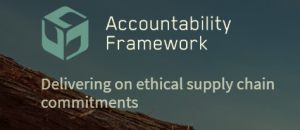Accountability Framework Initiative Releases Draft Of Core Principles, Invites Feedback

26 July 2018 | Nearly 500 leading companies have pledged to eliminate deforestation from their supply chains, and the Tropical Forest Alliance (TFA 2020) recently found that these pledges are, in fact, changing the ways the world produces, procures, and distributes products like soybeans, oil palm, beef & leather, and pulp & paper. It also, however, found that those changes aren’t yet reducing deforestation at a meaningful rate, in part because everyone seems to be defining the challenge differently.
Corporate commitments come in all shapes and sizes – from promises that all supplies are certified (as Mars did for soy) to pledges to avoid sourcing from all areas of tropical deforestation (as Kelloggs did for soy). “These companies complain, rightly, that environmental groups have never given them the straightforward guidance they need to implement their commitments,” wrote David Cleary of the Nature Conservancy last year. “Without that guidance, there is a risk that each company uses a different standard, no claims can be verified against an accepted benchmark, and no company will be able to make credible claims of progress.”
To get everyone on the same page, ten environmental NGOs last year launched the Accountability Framework initiative (AFi) to first take stock of all existing initiatives – including transparency tools like Global Forest Watch, Trase, and the Forest Trends Supply Change initiative – and then encourage coordination among them, with the aim of creating a global “Accountability Framework” that “defines good practices related to the establishment and implementation of commitments, addressing aspects such as supply chain management, monitoring, verification, reporting, and claims.”
This week, the AFi released draft core principles and is inviting input and feedback from as many companies, government entities, NGOs and other stakeholders as possible, with the aim of creating an Operational Manual that will included common definitions as well as guidance on ambiguous scenarios and topics where norms are currently lacking. You can find the core principles draft here, and you can join the process by contacting the partnership directly.
Please see our Reprint Guidelines for details on republishing our articles.

